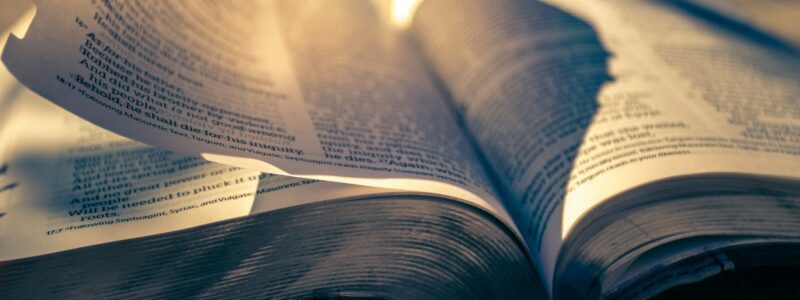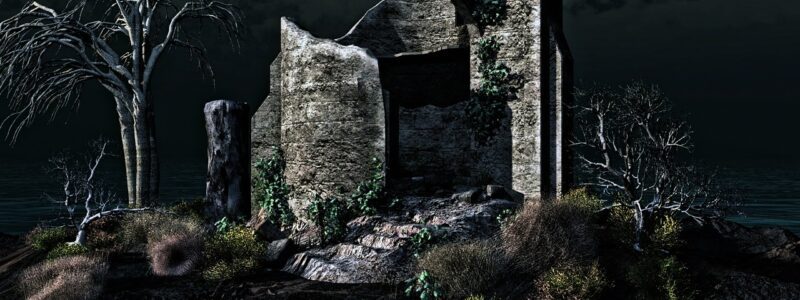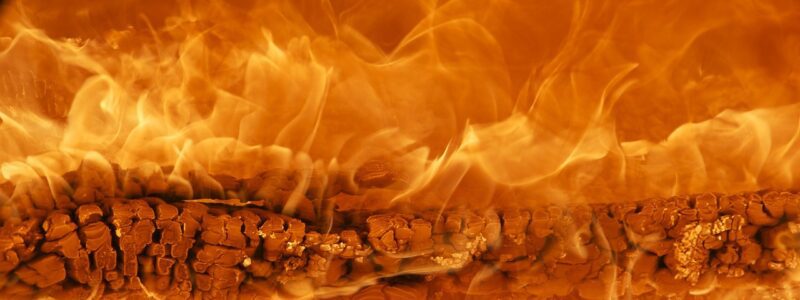God and Evil
God and Evil

God as a dove. Image by Gerd Altmann from Pixabay
Why does God allow such evil to exist in the world? Since God is all-powerful, why has he designed a world where there is so much pain and suffering?
This is a question that has been addressed for centuries by some of the greatest Christian philosophers in an area of Christian apologetics called theodicy. There are some very clear reasons why God might allow the amount of evil we now experience and we shall examine some of them here.
There are two principles that God has put into the world we live in that mandate some degree of discomfort and frank evil. Natural evil is produced by the natural world, things like tornados, earthquakes, and floods. How can a loving God allow the degree of natural evil we see all around us.
Natural Evil
J. Warner Wallace posits four reasons why there might be such natural evil in a world made by a loving God,
Natural Evil might be required as a result of necessity. The logic is that God created a universe with certain natural laws that make life possible on earth. Weather systems might produce tornados and floods also make lakes and streams that fertilize land for crops needed for human existence. The plate tectonics that produces earthquakes also recycle carbon to maintain atmospheric temperature. In this construct, natural laws needed for the existence of life in an earth environment that remains stable for millions of years might also produce destructive forces.
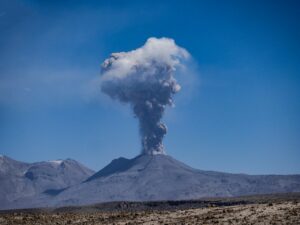
The natural disaster of a volcano.
Natural Evil can be magnified by the poor choices of mankind’s free agency. People often bring about their destruction through their poor choices given their environment. For example, people who build towns and cities right next to an active volcano should not be surprised when the volcano becomes active and destroys the city. Los Angeles is a city of many millions built on an active fault line that will someday produce a huge earthquake that might destroy the entire city.
Natural Evil might be to fulfill God’s purpose. We think of natural evil as always being evil, but sometimes it might result in a greater good. God may use natural devastation to focus our attention on the possibility of a future life and what we need to do to procure that life. God cares much more about our eternal future than about our current comfort level.
Natural Evil may be to encourage Godly character. The best in humanity often arises in response to a large natural disaster. People who scarcely talked to each other begin to cooperate for each other’s good. Victims of disaster have the chance to develop traits such as love, compassion, and cooperation which might point people to God. God’s creation provides us with the opportunity to serve those in need, and become better people in the process.
Personal Evil

Image by socialneuron from Pixabay
The second principle is that God has given humans a remarkable degree of freedom. Because of this freedom, people can make thoughtful choices; we are not the robotic machines so many atheists would have us believe.
People who commit evil usually have a reason for their behavior. Rationalization becomes especially easy when no objective truth is recognized. No objective truth means no objective morality. Morality then becomes whatever each individual says it is. Rioting and the destruction of property are allowed as long as the cause is “just” – at least to the mob. Situational ethics is the result of the post-modern philosophy that affirms the adage that truth is in the beholder’s eye.
Hitler and the Nazi regime in Germany believed in eugenics and Darwinian evolution. This philosophy made it easy to rationalize the killing of certain races and the murder of disabled people as improving the human race. Darwinian evolution was merely being accelerated by the death camps to bring about the human utopia of a superior race being developed.
Philip Yancey had this to say about these principles,
By committing himself to these two principles, both good principles in themselves, God allowed for the possibility of their abuse. For example, water proves useful to us and all creation because of its “softness,” its liquid state, and its specific gravity. Yet those very properties open up its rather disagreeable capacity to drown us – or the even more alarming possibility that we may drown someone else.
Take another example, from wood. It bears the fruit of trees, supports leaves to provide shade, and shelters birds and squirrels. Even when taken from the tree, wood is valuable. We use it as fuel to warm ourselves, and as construction material to build houses and furniture. The essential properties of wood – hardness, unpliability, flammability – make possible these useful functions.
But as soon as you plant a tree with those properties in a world peopled by free human beings, you introduce the possibility of abuse. A free man may pick up a chunk of wood and take advantage of its firmness by bashing the head of another man. God could, I suppose, reach down each time and transform the properties of wood into those of sponge, so that the club would bounce off lightly. But that is not what he is about in the world. He has set into motion fixed laws that can be perverted to evil by our misguided freedoms.
John Hick wrote a book titled Philosophy of Religion in which he tries to envision a utopian world where there is no pain and suffering but people still have the choices of free will. The consequences of this situation would be far-reaching and would not work in reality.
For example, no one could ever injury anyone else. The murderer’s knife would turn into paper or his bullets into thin air. Fraud, deceit, conspiracy, and treason would somehow always leave the fabric of society undamaged. There would never be failure because failure is one of the most painful experiences of life. You would not have to take care of your health, there would be no cancer or heart attacks. You would not have to try hard at relationships because there would be no pain from rejection. There would be no pain from divorce. So, people could live as reckless as they desire and not have to worry about the consequences.
He then goes on to say,
Courage and fortitude could have no point in an environment in which there is, by definition, no danger or difficulty. Generosity, kindness, the agape aspect of love, prudence, unselfishness, and all other ethical notions would presuppose life in an objective environment could not even be formed. Consequently, such a world, however, well it might promote pleasure, would be very ill-adapted for the development of moral qualities of human personality. In relation to this purpose, it might be the worst of all possible worlds.
The author concludes that a world that encourages the development of an ethical life must have the ability not to be ethical; in other words, much like our current world. There must be real dangers and difficulties with the possibility of defeat and sorrow to mold character and resilience.
To be clear, God did not create evil – only the possibility of evil by giving people freedom. It is logically not possible to create a world in which there is no permissible evil while allowing free will. God wanted to create a special type of creature that could relate to Him and other people through love and kindness in a meaningful way. Love of this nature cannot be forced or coerced; it has to be freely given with the possibility that it might also be withdrawn.
Man’s natural depravity and evil, self-centered nature make a good and perfect society difficult while making a depraved society – like the one we currently have – much easier.
Transformation
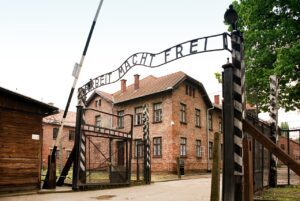
Auschwitz concentration death camp – By xiquinhosilva – https://www.flickr.com/photos/xiquinho/16380127035/, CC BY 2.0, Link
There is little doubt that left to our own devices, society tends to settle like water to its lowest possible level and still have any society left. We only need to look at the history of the last century to understand how far downhill the depraved society of mankind can descend.
One of the most remarkable true books showing the depravity of people and the transformative purpose of the Gospel is Dr. Ernest Gordon’s Through the Valley of the Kwai. Some might remember the movie Bridge over the River Kwai which memorialized the enduring spirit of men. But in the real world, the situation was much different. The bridge was built by a Japanese labor prison camp.
The inhuman living conditions and descent into despair due to these conditions are detailed in the book,
AuschwitAs conditions steadily worsened, as starvation, exhaustion, and disease took an ever-increasing toll, the atmosphere in which we lived became poisoned by selfishness, hate, and fear. We were slipping rapidly down the slope of degradation … We lived by the law of the jungle. … “I look after myself and to hell with everyone else.” … The weak were trampled underfoot, the sick ignored or resented, the dead forgotten. When a man lay dying we had no word of comfort for him. When he cried we averted our heads. Men cursed the Japanese, their neighbors, God. … We had no church, no chaplains, no services … many had turned to religion for the first time. The the crutch had not supported them; sot hey had thrown it away. … We had long since resigned ourselves to being derelicts.
These were the inhumane conditions that pervaded the prison slave camp. Then something happened which transformed these hopeless men. Several of the prisoners sacrificed themselves to air others. One Christian gave his rations to a sick and dying man. Over time, the sick person started to gain strength while the Christian friend finally collapsed and died from self-imposed starvation,
One day Gordon was approached by an Australian sergeant. He said that he and his men wanted to explore Christianity. He sais, ‘Maybe there is something to it that we haven’t understood.” And they knew that Gordon had a Bible.
At their first meeting, there were several dozen men in attendance. Gordon would read and expound on the New Testament. They had discussion about their own inner questioning and their desire for spiritual truth.
Through the Bible readings, many of these prisoners came to know the Biblical Christ and concluded Jesus was the incarnate Word. Gordon said,
In the fellowship of freedom and love, we found the truth, and with the truth a wonderful sense of unity, of harmony, or peace.
The numbers of these erstwhile Christians gradually increased as word spread throughout the camp. They came to realize what it means to be a real Christian.
We were learning what it means to be alive – to be human. As we became more aware of our responsibility to God the Father, we realized that we were put in this world not to be served but to serve. This truth touched and influenced more of us, even those who shunned any religious quest. There was a general reawakening. Men began to smile – even to laugh and to sing.
The prisoners even had Communion,
With expectant hearts, men had come to receive the strength that only God could give. The elements were of our daily life – rice baked into the form of bread and fermented rice water. The solemn words of the fraction were said.
We broke the bread as it was passed to us and then passed it to our neighbor.
The elements were returned on the Table, a prayer of Thanksgiving said, a hymn was sung, and a blessing given. We slipped quietly away into the singing silence of the night, cherishing as we did so our experience of the communion of saints. The Holy Spirit had made us one with our neighbors, one with those at home, one with the faithful in every land, in every age, one with the disciples.
All the while, our own future was unpredictable. We didn’t know what the Japanese might have in store for us. We had no assurance that we would ever again see home or those we loved.
Result of Transformation
These men knew that their descent into depravity and despair was not the route they should travel. They chose to turn to the only one who might be able to deliver them through a spiritual transformation. This is the only real hope for the evil in the world. They were unable to change the demeanor or intentions of their Japanese prison guards but they could change themselves and how they reacted to their situation.
This is the only real hope against evil practiced by others – the transformation of ourselves and hope for the transformation of others.
Summary of God and Evil
So what is the purpose of suffering in this narrative? Many of the soldiers who took Communion that day memorialized in this book did not make it home. They died a miserable death in a faraway land with their burial place known but to God.
Their situation is repeated throughout the world even today. Being a practicing Christian is very difficult in many places; most Christians are today being actively persecuted in a manner foreign to the American experience. But why does God allow this to happen?
One reason might be that being a Christian is much more important than any worldly comfort. Christianity tends to flourish in those areas of the world where it is moist bitterly persecuted. This is true now, it has been true throughout world history, and it was true in that Japanese prison camp.
Gordon ends his narrative by says,
Whatever happened, we knew that Jesus, our leader, would never fail us. As He had been faithful to His disples in the first century, He would be faithful to us in the twentieth.
One reason God allows evil in the world is that it brings out the humanity of those suffering. It teaches us we are all interconnected, and that we should all take care of each other. The persecution is but for a season while the rewards are eternal.

